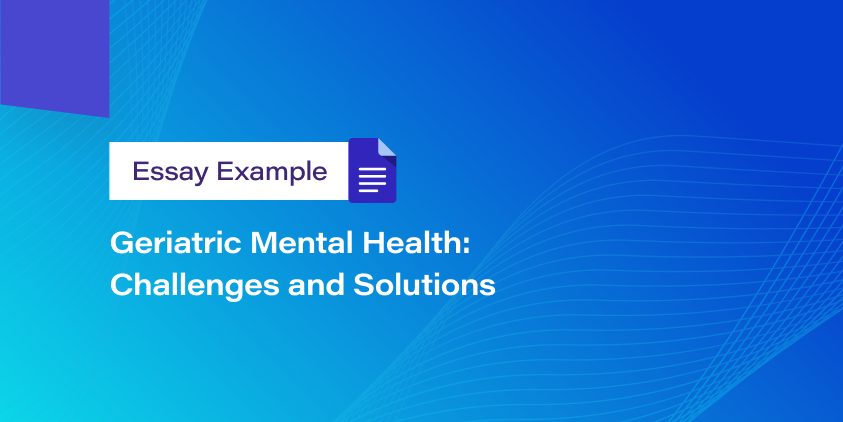Geriatric Mental Health: Challenges and Solutions

As people grow older, their mental health gets compromised. People 65 years and above are more prone to mental health than any other age. Of the most common mental illnesses is geriatric mental health, which is majorly witnessed in older people. According to a survey by Psychiatric Services, about one in five people over sixty-five years old suffer from this condition (Bartel, 2002). This illness comes with its fair share of issues and problems. Some of the issues faced by the sufferers of this illness include depression, schizophrenia, dementia, substance abuse, and anxiety. However, people facing these need not resign to fate as there are possible solutions for these problems.
Problems
One of the major issues that pertain to geriatric mental health is depression. Even though the prevalence of depression seems to decrease with age, depressive symptoms are usually on the rise. Depression is often more common among older people than is usually realized. Failure to recognize and treat these symptoms leads to undesirable consequences. The consequences of late-life depression include pain and suffering and reduced quality of life (AAGPonline.org). Some of these symptoms lead to older people committing suicide in extreme cases. Dementia is also another common issue. Diseases like Alzheimer’s disease usually cause this. Older people are more prone to this disease. Dementia causes loss of memory. In America, about 10% of people over age sixty-five and almost 50% of those above eighty-five have Alzheimer’s disease or some form of dementia. Dementia brings about psychological and behavioral symptoms that can be very troubling to the relatives and colleagues of the sufferer.
Schizophrenia is also another common geriatric mental health problem. This problem seems more common in women than men in later life. Its prevalence is reported to be about 0.6% in people aged sixty-five years and above. Some of the symptoms of schizophrenia include hallucinations, bizarre behavior, delusions, and thought disorder. Anxiety in older people is the most common problem in geriatric mental health. For a long time, anxiety disorders were believed to reduce with age. Only recently was it discovered that it is as common in the old. Anxiety in the old goes hand in hand with depression. Some causes of anxiety in older people include cognitive problems, emotional losses, and chronic physical problems. Anxiety is, however, a treatable condition.
Substance abuse is also an issue that cannot be downplayed in geriatric mental health. Even though it is an issue that is rarely focussed on, it is present and real. Substance abuse in older adults occurs mainly due to alcohol abuse and self-prescription of drugs as opposed to abuse of illegal drugs. It is estimated that older people use drugs thrice as much as the general population and are more prone to over-the-counter medication. This poses a major threat to their mental health. Alcohol abuse may result from grief, depression, or loss of economic power.
Issues
The issues that pertain to geriatric mental health can and should be solved to make life more comfortable for this generation. This would also reduce the rate of suicide in this group of people. These issues are solved differently depending on the issue in question. In most cases, medication is available. However, social approaches and counseling are more efficient and long-lasting solutions than medication.
A change of lifestyle can best reduce depressive symptoms. Good habits such as exercise, good dietary habits and home safety significantly reduce depressive symptoms. Other methods that can be employed to curb stress include education and problem-solving therapy. In some cases, antidepressants can be used to reduce depressive symptoms.
In the case of dementia, by identifying the triggers of dementia and assessing and changing them, one can promote the sufferer’s well-being, comfort, and functionality (University of Iowa, 2009). Dementia due to Alzheimer’s requires prevention, management, and reduction of the behavioral symptoms arising from the condition. Caregivers attending to these patients are trained to give effective care by reducing stress, promoting functional behavior and effective communication methods, and managing the simple delusions.
Schizophrenia is best managed through medication, therapy, and counseling from one’s physician. Medication is available in the form of antipsychotic drugs. However, the newer atypical antipsychotics are recommended for the elderly as they have fewer extrapyramidal side effects. Caregivers should work with the patients by providing social distractions. Family support is also vital when dealing with this condition (Abilify, 2009).
One of the major steps in doing away with anxiety in the elderly is identification. A physician usually does this. Once the condition has been identified, treatment can then follow. Treatment is available in the form of medication and psychosocial therapy. Antidepressant drugs are usually preferred over anti-anxiety drugs to reduce anxiety. However, total success is achieved only with cooperation from the physician, the patient’s family and the patient (Healthyplace.com, 2007).
Regarding substance abuse, older adults are preferably referred to healthcare providers. Elderly people benefit mostly from psychological counseling with people of the same age. When substance abuse is due to depression from bereavement or economic loss, the cause of depression should be dealt with.
Geriatric mental health can sometimes be an issue of concern and a source of stigmatization due to its associated issues. However, with proper management, this need not be an issue that is out of hand and a source of stigma as the people suffering from this illness have a chance to live a normal life.
